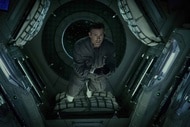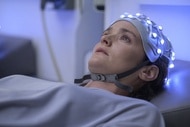Mission to Mars and Red Planet: Why Hollywood's brief obsession with Mars failed to take off

Second time's the charm appears to be the general box office rule of thumb when it comes to twin blockbusters, that strange phenomenon when two different major studios somehow hit on the same tentpole idea at exactly the same time. Armageddon obliterated Deep Impact, A Bug's Life squished Antz, and White House Down toppled Olympus Has Fallen. Yet during the not-so-great space movie race of 2000, when Mission to Mars and Red Planet hit theaters eight months apart from one another (March 6 and Nov. 10, respectively), it was the first to launch into cinemas that reigned supreme.
You could argue, however, that there wasn't really a winner at all. Sure, Mission to Mars pulled in nearly $80 million more than Red Planet. But as a bigger-budgeted, starrier affair based on a Disney theme park ride, Touchstone Pictures was no doubt expecting to finish higher on the year-end's highest-grossers list than No. 40 (and above Coyote Ugly, Road Trip, and Pokémon the Movie 2000, too).
For the many who completely ignored the big-screen coincidence and need a refresher on what these two movies were about: Mission to Mars charts a pioneering deep space journey that gets sidetracked when an investigation into a mysterious Martian structure, potentially helpful for any future colonization, turns disastrous. It’s a similar story in Red Planet, where a quest to find how a terraforming project has malfunctioned soon turns into a fight for survival.
So why did audiences greet two films journeying to such exciting, uncharted territory with a resounding meh? After all, only three years earlier the landing of the Pathfinder rover — NASA's first successful attempt to reach the Martian surface since the Viking Probes two decades previously — had reignited interest in the possibility of life on Mars. The timing couldn't have been more perfect.
Well, the talent behind and in front of the cameras didn't exactly scream 'record-breaking smashes,' for one thing. Making the step up from Apollo 13's mission control room to Mission on Mars' spacecraft, Gary Sinise appears entirely overwhelmed at having to front such a costly spectacle. Tim Robbins was less of a stranger to taking center stage, but his forte was more auteur-driven Oscar fare than bums-on-seats epics. And Brian De Palma — a man renowned for provoking the censorship board with his predilection for violence and cursing — seemed a curious choice to helm a PG-rated affair whose strongest profanity is "son of a b****."
Village Roadshow Pictures, meanwhile, trusted a complete novice with $80 million to direct its alternative Mars mission: Antony Hoffman had cut his teeth in the world of high-end TV commercials and, following the disastrous response to Red Planet, never stepped foot on a film set again. Val Kilmer and Tom Sizemore, two actors whose careers would soon nosedive into straight-to-DVD territory, probably didn't help matters, either. The pair reportedly spent most of the shoot in Southern Jordan's Valley of the Moon on the verge of knocking seven bells out of each other.
Admittedly, Kilmer's cocky systems engineer Robby is the only real engaging presence in an unlikable crew of cookie-cutter personalities tasked with troubleshooting a Mars colonization project: The oxygenic algae needed to make the planet habitable has mysteriously vanished and after an hour of forced banter, backstabbing, and pseudo-mumbo jumbo (the early exit of Terence Stamp's groan-worthy philosopher comes as sweet relief), we learn that parasitic, highly flammable insects are to blame.
With a narrative based on the disappearance of bio-engineered algae, it's perhaps little surprise that Red Planet failed to draw the crowds. Still, to be fair, Hoffman does maintain a sense of jeopardy that's largely missing from its inter-planetary rival. There's a terrific crash sequence in which the lander, protected by brown airbags that resemble giant Maltesers, bobbles around the desolate Martian landscape. And as each crewman (Carrie-Anne Moss' commander Kate is sadly consigned to spouting instructions from the damaged main ship) is picked off one by one, the film becomes a more compelling venture into survival horror. There's even a malfunctioning killer robot.
Colonization is also the focus in Mission to Mars, although set 36 years earlier (2020, in fact), its efforts aren't quite as advanced. And as the expedition inevitably runs into difficulties, De Palma delivers a few hair-raising set pieces of his own. Robbins' leader Woody heroically sacrifices himself in the name of love during a visually stunning, if disastrous, float in the cosmos. And a monstrous sandstorm that takes out all the bit-players in one fell swoop (leaving Don Cheadle's Luke marooned) provides a limb-ripping death that inspires gasps and guffaws in equal measure.
Yet the movie abandons all thrills by the halfway mark, choosing instead to veer into existential sci-fi and toward a mind-boggling denouement that offers an alternative history of evolution. It turns out us Earthlings descend from Martians who seeded our planet with DNA after evacuating their asteroid-struck home, apparently with the hope the lifeforms they helped create would one day return and join the dots?
Almost as bizarrely, the whole story is relayed to the human visitors in a giant planetarium display they're guided through by an unconvincing holographic alien. Mission to Mars was no doubt aiming to invoke the same sense of wonder as 2001: A Space Odyssey and Close Encounters of the Third Kind. But while its elegant spaceship design (created with aerospace engineer Robert Zubrin) and swooping shots of the galaxy are worthy of the Kubrick and Spielberg classics, it doesn't come close to capturing their intelligence and emotional heft.
Its characters are undoubtedly less objectionable than those of Red Planet. However, they're also blander, with only Jerry O'Connell’s peppy technician making any notable impression (even if the role stretches credulity as much as Denise Richards playing a nuclear physicist). The film beats us over the head about the great friendship Luke, Jim, and Woody share, yet there's not a shred of chemistry between them. It's the same with the latter's devotion to wife Terri (Connie Nielsen). You'd expect a visual storyteller like De Palma to show not tell.
Nevertheless, it was Mission to Mars that gained the more critical praise, albeit mostly faint, on its turn of the century release (its Rotten Tomatoes rating stands at 25 percent compared to Red Planet's 14). France’s well-respected monthly magazine Cahiers du Cinema even placed the movie fourth in its end-of-year poll.
That seems slightly unfair to Red Planet, which boasts more tension, semi-realism, and even a few decent gags ("This is it," Robby tells Kate. "That moment they told us in high school where one day, algebra would save our lives"). To be clear though, neither is a misunderstood classic.
Yes, both are more watchable than their flop reputations would suggest but they also both suffer from wafer-thin characterization, phoned-in performances, and ideas above their station. Of course, with Ghosts of Mars, Mars Needs Moms, and John Carter of Mars all majorly flopping in their wake, too, it appears that cinemagoers just don’t find Mars that hospitable, in general.
Perhaps it’s the prospect of staring at a dusky red landscape for more than a few minutes that’s the deterring factor (the only Mars-based hit in recent times, The Martian, spends almost as much time on Earth as it does in deep space). Maybe the real-life Mars missions have shattered the mystique of the planet itself? Now we know for sure that its lifeforms are of the microscopic variety and not tentacled, bug-eyed beasts, audiences may find it tougher to let their imaginations wander as they did back in the B-movie era.
Or could it be that we simply prefer the familiar when it comes to movies set in the final frontier? More visible and more reachable, the moon appears to have little problem enticing big audiences (Apollo 11 was the second-highest-grossing documentary of 2019). Either way, Hollywood might be better off leaving all the red planet exploration to Elon Musk.




























